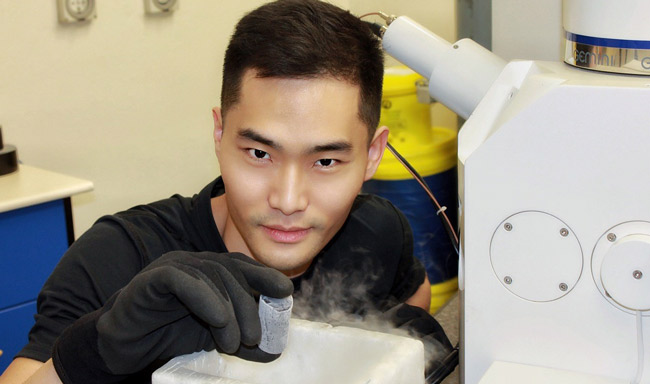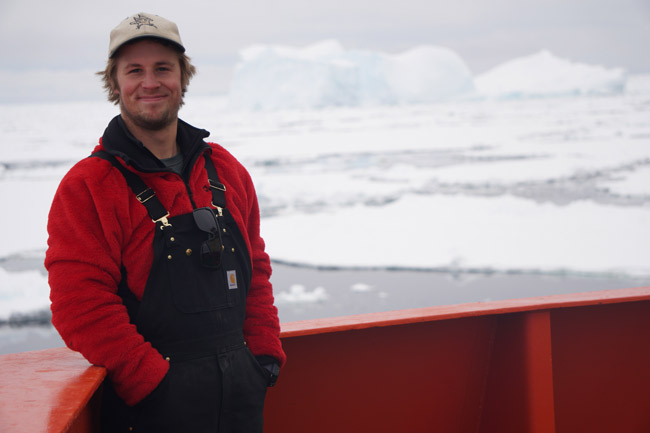Thursday 12 July 2018 9:05pm
Antarctic glaciers and microscopic algae will soon be the focus of two University of Otago students who have just been awarded two of three Antarctica New Zealand Scholarships for 2018.
Sheng Fan

Sheng Fang and his ‘mini glacier’ in his University of Otago science laboratory.
When Sheng Fan moved to Dunedin from China just over a year ago, he was planning to study tectonic movement and New Zealand’s Alpine fault. Little did he know that a different type of geographical movement was on his horizon.
“I never thought I would be able to do Antarctic research. It has always been a dream of mine, but until I came here, I really didn’t think it would be possible,” says the University of Otago PhD candidate.
But Sheng’s dream is about to come true. He has just been awarded the Antarctica New Zealand Scholarship which will see him travel to Antarctica this season to research glaciers.
“This opportunity to test my scientific ‘imaginations’ in Antarctica is incredible. I’m using technology in a new way to measure how glaciers flow … it’s really exciting.”
"To get this first-hand data is really exciting. Scientists have applied seismological instruments in the past – but never like this in an Antarctic glacier."
Sheng is studying how dust and gravel in glaciers influence their flow. This season, he’ll use sound waves to measure the ice structure and how it moves under different stress.
“The first step is to make mini glaciers in the lab and experiment on how they flow with dust particles. Then, when I go to Antarctica, I’ll be able to upscale that model to a life-size experiment!” he says.
“To get this first-hand data is really exciting. Scientists have applied seismological instruments in the past – but never like this in an Antarctic glacier.”
Sheng will collaborate with scientists at New Zealand’s Scott Base as well as from the Korean Antarctic Programme.
“International co-operation is really good. We’ll learn a lot from each other, especially when it comes to applying different types of technology.”
Sheng hopes his project will have a positive outcome and is confident it will benefit New Zealand research.
“New Zealand is a great place for research, I am so grateful for the support I have received here. If I get the chance, I would really like to contribute more to the New Zealand Antarctic research programme.
“Special thanks goes to my supervisor, Professor David Prior. I sincerely appreciate his trust, support and guidance.”
Antarctica New Zealand Acting Chief Scientific Advisor, Dr Fiona Shanhun, says Sheng’s innovative approach really impressed the panel choosing this year’s Antarctic Scholarships.
“Sheng is just starting out in his Antarctic science career yet, with this project, he has the ability to make a strong contribution to our knowledge. Antarctica New Zealand is thrilled to support top students like Sheng in our scholarship programme,” Dr Shanhun says.
Michael Bollen

Michael Bollen in the Southern Ocean.
“This really couldn’t have come at a better time.”
This is University of Otago Master of Science geology student, Michael Bollen’s reaction after receiving this year’s NZ Post Antarctic Scholarship.
“It means I could travel to Switzerland for the SCAR (Scientific Committee on Scientific Research) Open Science Conference, and to Stanford University, California, to complete my research,” he says.
Michael is studying geology at the University of Otago and last year, was invited to sail to the Southern Ocean with an oceanography research group from Stanford University.
Michael is studying the layers of life (microscopic algae called diatoms) that died and settled into the sediment over the last million years. These diatoms hold chemical fingerprints of what the oceans were like at the time they died.
Michael is working on how to extract these “fingerprints” and thereby more accurately reconstruct past conditions. He is working on core samples of the seabed obtained by the Korea Polar Research Institute (KOPRI).
"If we can understand what conditions diatoms like - like temperature, saltiness and sea ice cover - we can then look back in time, and effectively read a ‘book of history’ to see how it’s changed through time in that place."
The NZ Post Antarctic Scholarship means Michael will travel to the Antarctic continent to look at life growing underneath sea ice with Associate Professor Ken Ryan from Victoria University of Wellington.
It’s a dream come true for this second year masters student who is passionate about algae.
“Algae’s like the forest of the ocean. They’re a huge carbon dioxide sink – they remove it from the atmosphere, then take it down to the sea floor with them when they die. This is a way the Earth can regulate its greenhouse gas levels.”
Using core samples, Michael hopes to find out how carbon cycling has changed over the years.
“If we can understand what conditions diatoms like - like temperature, saltiness and sea ice cover - we can then look back in time, and effectively read a ‘book of history’ to see how it’s changed through time in that place … and that’s pretty neat!”
NZ Post has sponsored an Antarctic Scholarship for 15 years. Spokesman, Simon Allison, says NZ Post’s aim is to help attract and support new students in Antarctic science careers.
“NZ Post is proud to support these bright young minds in such an important area of study. We know it’s difficult for post graduates to find funding and we have enjoyed watching this scholarship help jump start careers” he says.
Michael’s supervisors are Dr Christina Riesselman and Dr Christian Ohneiser.
Sheng and Michael are two of three candidates to receive Antarctic Scholarships this year, along with Florence Isaacs, from Victoria University of Wellington.
